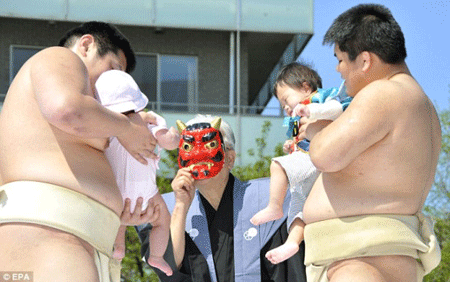
If you’re a parent looking to promote the health of your infant or toddler, you might want to make some travel arrangements for next Spring to visit Tokyo and the ‘Nakizumo Festival,’ which happens annually at the Sensoji Temple in Asakusa.
The Sensoji Temple is the oldest Buddhist temple in Japan, completed in 645 A.D, and is host to a wide variety of events.
The Nakizumo Festival, which translates to ‘baby cry sumo,’ dates back nearly four-hundred years, and took place again this past April 25th.
Clips of the event populate YouTube and may seem disconcerting to some, but the mythology surrounding the Festival outweighs the doubts of the au fait.
The origins of the Festival are themselves unclear, but it is speculated that the cry of a baby once warded the influence of an evil spirit during the Edo era in Japan’s history, and therein the Festival found its beginning.
For the attendees, the parents of the participants, the loud wail of a baby, which can be anywhere from six-months to three-years old, means good health and good fortune. The louder the cry, the healthier the child.
The competition begins from a blessing from the overseeing Buddhist monk. He places a ceremonial stamp of the forehead of the entrants and then two officiating sumo shrine officials hold the babies and employ various methods in order to drive the baby to tears.
If the sumo wrestler’s growls, grunts, grimaces don’t produce the desired effects, other officiators donning ‘ogre masks’ step in to frighten the competing children.
Pictures of the event detail scantily-clad sumo wrestlers, traditionally-robed Buddhist monks, and droves of smiling parents. All signs point to the lightheartedness of the tradition, though it is taken seriously enough as thousands of mothers line up to bless and test the health of their confused children.
Yet the tradition is not so very different from the baptism of infants in the West, in that babies will most likely agree universally that if presented the option, they would rather be eating or sleeping.
Source : http://www.nileguide.com




